The Adventures in Jewish Studies podcast was created to fulfill the AJS mission of fostering greater understanding of Jewish Studies scholarship among the wider public. Podcast episodes are designed take listeners on exciting journeys while exploring a wide range of topics, from the contemporary to the ancient, in ways that are informative, engaging, and fun.
Launched in 2018, the Adventures in Jewish Studies series produces five episodes annually. Each episode features the voices of AJS members as they share their expertise and research with listeners.
This podcast is generously supported by The Salo W. and Jeannette M. Baron Foundation and the Diane and Guilford Glazer Foundation.
Support the Podcast with a Donation
Signing in to the new MyAJS for the first time?
Login Instructions
Anti-Zionism with James Loeffler
November 17, 2025
Guest scholar James Loeffler looks at the different forms of anti-Zionism and its overlapping relationship with antisemitism, and considers how the past can remind us that it is possible to have a principled and logical critique against Zionism.
This episode is the fourth in a special four-part mini series of short episodes on antisemitism. This series has been produced in response to rising numbers of antisemitic incidents and attacks around the world.
U.S. Antisemitism with Pamela Nadell
November 11, 2025
Guest scholar Pamela Nadell talks about antisemitism in America. She looks at how the definition of antisemitism has changed over time, how antisemitism has been always threaded throughout the American Jewish experience, and how this current moment is an explosion of something that had been lying fairly dormant.
This episode is the third in a special four-part mini series of short episodes on antisemitism. This series has been produced in response to rising numbers of antisemitic incidents and attacks around the world.
Medieval Antisemitism with Sara Lipton
November 4, 2025
Guest scholar Sara Lipton discusses antisemitism in medieval Europe. From the Nazis in the 20th century to current alt-right movements, many of history’s and modernity’s most prominent antisemitic groups have drawn on beliefs and motifs that first emerged during the Middle Ages. But conspiracies and caricatures didn’t emerge overnight – they were a product of centuries-long shifts in political and religious dynamics.
This episode is the second in a special four-part mini series of short episodes on antisemitism. This series has been produced in response to rising numbers of antisemitic incidents and attacks around the world.
Structural Antisemitism with Magda Teter
October 30, 2025
Guest scholar Magda Teter discusses structural antisemitism, or the laws, policies, institutional practices and entrenched norms which single out Jews and discriminate against them. These restrictive practices, which date back to Roman times, have served to remind Jews of their place in society and in religious structures.
This episode is the first in a special four-part mini series of short episodes on antisemitism. This series has been produced in response to rising numbers of antisemitic incidents and attacks around the world.
The World of Sephardic Food
August 4, 2025
Jewish food is no longer confined to what you’d find on a deli menu. Bourekas, shakshuka, adafina, jachnun, and harira have claimed their place on the Jewish dining table right alongside blintzes, cholent, kugel, borscht, and matzoh ball soup.
Join guest scholars Ari Ariel, Hélène Jawhara Piñer, and Noam Sienna, along with host Avishay Artsy as they explore the diverse world of Sephardic Jewish food, where recipes can tell us about immigration, assimilation, memory, identity, the Jewish past and potential futures, and so much more.
When Life’s a Drag: A Look into the History of Jews & Cross-Dressing
March 10, 2025
Every year on Purim, Jews around the world stage shpiels, or plays, that not only feature people in costumes, but cross-dressing as well. These Purim events have allowed Jews to participate in drag throughout history, and have opened the door for other traditions like cross-casting in theater.
In this episode, we’ll hear from scholars Golan Moskowitz and Naomi Seidman and former drag queen Rabbi Amichai Lau-Lavie about Jewish historical examples of drag, Jewish contributions to the art and culture of drag, and how Jews have used drag to explore trauma, identity, and belonging.
Death & Community: Jewish Burial Societies
January
22, 2025
The Jewish life cycle includes rituals and customs to mark major rites of passage – birth, coming of age, marriage and parenthood. Likewise, there are traditions of how to navigate death and mourning, including how to care for the deceased and comfort the living, which is where we find Jewish burial societies.
In this episode, guest scholars Cornelia Aust, Samuel Heilman, and Howard Lupovitch, along with host Avishay Artsy, look at the history of Jewish burial societies, how they have served their communities, and how they continue to evolve today.
Around the World with Jewish Newspapers
November
20, 2024
In this episode, host Erin Phillips and guest scholars Zachary Baker, Philip Keisman, and Devin E. Naar discuss four Jewish newspapers from across the 19th and 20th centuries. Every detail in their pages provides clues about Jewish life in a particular time and place - from the advertisements in their margins, to the letters to the editor, to even the news articles they choose to excerpt from other publications, these newspapers provide scholars with a valuable window into a historical, geographical, and linguistic cross-section of Jewish history.
Alternative Zions: The Jewish Territorialist Movement
October
21, 2024
The quest for a homeland, to journey from bondage and persecution, has been inherent to Jewish history for as long as it’s been told. In this episode, join scholars Laura Almagor and Adam Rovner and guest host Devan Schwartz in exploring the Jewish Territorialist Movement. We’ll travel back in time and across the globe to explore proposed alternative homelands for the Jewish people – and what these projects teach us about Jewish history and culture to this very day.
What Makes Someone Jewish?
September
10, 2024
In this episode, host Avishay Artsy and guest scholars Noah Feldman, Susannah Heschel, and Shaul Magid consider what makes someone Jewish by asking three questions: What are the Jews exactly? What do Jews believe, and how central is religion to Jewish identity? Where does the Jewish state fit into Jewish identity?
Jewish Head Coverings: A Blessing On Your Head
June 20, 2024
The yarmulke has become an almost universal symbol of Judaism; however, Jews around the world cover their heads and hair in many different ways, including hats, wigs, and scarves. This custom isn't Jewish law, but was developed over centuries as a community norm that continues on in a variety of ways today.
In this episode, guest scholars Eric Silverman and Amy K. Milligan discuss the history and practice of head and hair covering – and what the practices reveal about Jewish experiences of gender, assimilation, and antisemitism.
Images of the styles discussed in this episode are available on the episode page.
Yiddish Socialists and the Garment Industry
February
12, 2024
A century ago, Jews were at the center of the American garment industry and at the forefront in the battle for those workers’ rights. In this episode, host Avishay Artsy speaks to Daniel Katz and Caroline Luce about how Yiddish-speaking immigrants fused class and culture to empower generations of garment workers.
Rethinking Holocaust Education
December 13, 2023
A sharp rise in antisemitic incidents has led to increased calls for mandatory Holocaust education. In this episode, host Avishay Artsy speaks with educators Sarah Ellen Zarrow and Jody Spiegel about the use and misuse of Holocaust memory for combating antisemitism.
Jews in Colonial America
October 24,
2023
This episode of Adventures in Jewish Studies explores the lives of Ashkenazi and Sephardic Jews who settled in what are now the states of Georgia, New York, Pennsylvania, Rhode Island, and South Carolina as far back as the late seventeenth century. These early settlers, who came escaping religious persecution and seeking trade opportunities, reflect how entwined Jews have been in shaping American history. Guest scholars Shari Rabin and Toni Pitock, along with host Erin Phillips, discuss what we know about these early Jewish settlers, why information is limited, and how researchers are working to learn more.
[ direct link to episode | transcript ]
Throughout the world, Jewish diaspora communities set out on pilgrimages to visit holy sites in search of wisdom, healing, and blessings. But these pilgrimage journeys, no matter where or why they take place, are about much more than the physical destination. In this episode, host Erin Phillips and guest scholars Adane Zawdu-Gebyanesh, Chris Silver, and Alexandra Mandelbaum take us on three Jewish pilgrimages as they explore the social and spiritual functions of Jewish pilgrimages and discover common elements that tie all kinds of Jewish pilgrims together.
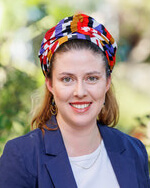
Alexandra Mandelbaum
Alexandra Mandelbaum is a fellow in the Maskilot program at the David Hartman Center for Intellectual Leadership. She is writing her doctoral thesis in the Department of Jewish Thought at Ben Gurion University and her research focuses on Breslov Hasidism and the ideological fluctuations within Jewish society. Over the years, she has been involved in leading and coordinating projects in the field of Jewish and Israeli culture. As part of the “Cultural Brigade” she wrote, produced, and created two plays that dealt with Russian-Israeli identity.
Christopher Silver is the Segal Family Assistant Professor in Jewish History and Culture in the Department of Jewish Studies at McGill University. He earned his PhD in History from UCLA. He is the author of numerous articles on North African history and music, including in the International Journal of Middle East Studies and Hespéris-Tamuda. He is also the founder and curator of the website Gharamophone.com, a digital archive of North African records from the first half of the twentieth century. His first book Recording History: Jews, Muslims, and Music across Twentieth-Century North Africa was published in June 2022 with Stanford University Press.
Adane Zawdu-Gebyanesh, PhD, is a cultural sociologist who focuses on how categories of difference structure our social and political experience, with a particular interest in ethnic and racial categorization. He was the 2020-2021 Jonathan Shapiro postdoctoral fellow in the Department of Sociology and Anthropology at Tel Aviv University, and is currently a Polonsky Fellow at the Polonsky Academy for Advanced Study in the Humanities and Social Sciences, based at the Van Leer Jerusalem Institute.
[ direct link to episode | transcript ]
Kabbalah, one of Judaism’s most sacred schools of thought, has served as a wellspring of Jewish faith, a portal to mystical knowledge, and a bridge for intercultural and interreligious exchange. In this episode, host Avishay Artsy speaks with guest scholars Clémence Boulouque and Hartley Lachter about the many lives of Kabbalah.
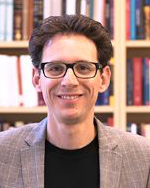
Hartley Lachter
Hartley Lachter is Associate Professor of Religion Studies at Lehigh University, where he directs the Berman Center for Jewish Studies. His scholarship focuses on medieval Kabbalah, with a particular emphasis on the relationship between Jewish historical experiences and the development of kabbalistic discourses. He is the author of Kabbalistic Revolution: Reimagining Judaism in Medieval Spain.
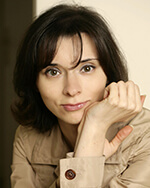
Clémence Boulouque is the Carl and Bernice Witten Associate Professor in Jewish and Israel studies at Columbia University. Her interests include Jewish thought and mysticism, interreligious encounters, intellectual history and networks with a focus on the modern Mediterranean and Sefardi worlds, as well as the intersection between religion and the arts, and the study of the unconscious. She is the author of Another Modernity: Elia Benamozegh's Jewish Universalism, and serves as the co-editor of the Stanford Studies in Jewish Mysticism series.
[ direct link to episode | transcript ]
While the Talmud famously forbids sorcery, Jewish history is full of examples of what many today might refer to as "magic." In this episode, host Erin Phillips and guest scholars Sara Ronis, Marla Segol, and Michael Swartz take us on a spellbinding journey to discover magic's role in Jewish history as they discuss Jewish magical rituals and artifacts, angelology and demonology, and the evolution of magical practices in Judaism.
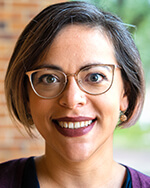
Sara Ronis
Sara Ronis is Associate Professor of Theology at St. Mary's University, Texas. She is the author of Demons in the Talmud: Demonic Discourse and Rabbinic Culture in Late Antique Babylonia.
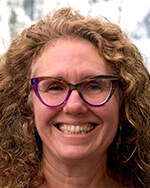
Marla Segol is a Professor and Director of Undergraduate Studies in the Department of Global Gender and Sexuality Studies at the University at Buffalo. She researches Kabbalah, Jewish Magic, Modern Esotericism, religious cosmopolitanism, and the history of the body and sexuality. Her most recent book is Kabbalah and Sex Magic: A Mythical-Ritual Genealogy.
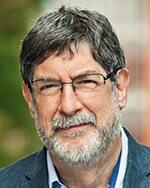
Michael D. Swartz is Professor of Hebrew and Religious Studies in the Department of Near Eastern and South Asian Languages and Cultures at the Ohio State University. His research focuses on the cultural history of Judaism in late antiquity, rabbinic studies, early Jewish mysticism and magic, and ritual studies. His most recent book is The Mechanics of Providence: The Workings of Ancient Jewish Magic and Mysticism.
[ direct link to episode | transcript ]
In this episode, host Erin Phillips and guest scholars Max Strassfeld and S.J. Crasnow explore how gender is constructed in Judaism. They critically examine what many refer to as the "seven genders of the Talmud;" discuss the experiences of transgendered and non-binary Jews today; and share how gender creativity is helping Judaism become more accessible and equitable for all.
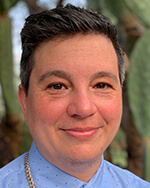
Max Strassfeld
Max Strassfeld is an Associate Professor of Religious Studies at the University of Arizona. They are the author of Trans Talmud: Androgynes and Eunuchs in Rabbinic Literature.
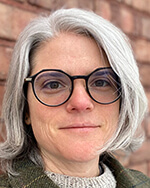
S.J. Crasnow
S.J. Crasnow is Associate Professor and Chair of Theology & Religious Studies at Rockhurst University. Their work focuses on religion, gender, and sexuality and often specifically explores the lived experiences of queer and trans Jews.
[ direct link to episode | transcript ]
Kol Nidre is recited at the beginning of evening Yom Kippur services, and serves as an emotional and dramatic opening to the Day of Atonement. However, over the centuries, this legalistic text has been maligned, ridiculed, banned – and even used to justify anti-Semitic attacks.
In this episode of the Adventures in Jewish Studies podcast, guest scholars Laura S. Lieber and Judah Cohen, along with host Avishay Artsy, discuss what Kol Nidre says, where its melody comes from, and the unique place it holds in Jewish religious and cultural life.
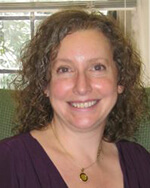
Laura S. Lieber
Laura S. Lieber is Professor of Religious Studies and Classics at Duke University, where she directs the Center for Jewish Studies and the Center for Late Ancient Studies. Her primary area of research is in the area of synagogue poetry ("piyyut") from Late Antiquity and the Byzantine Period.
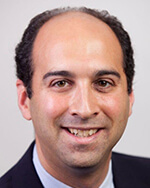
Judah Cohen
Judah Cohen is Professor of Music in Musicology at the Indiana University Jacobs School of Music, the Lou and Sybil Mervis Professor of Jewish Culture at the Indiana University Department of Folklore and Ethnomusicology, and director of the Robert A. and Sandra S. Borns Jewish Studies Program in the College of Arts and Sciences. His research interests include music in Jewish life, American music, musical theater, popular culture, Caribbean Jewish history, diaspora, and medical ethnomusicology.
[ direct link to episode | transcript ]
In this episode of Adventures in Jewish Studies, we’re looking at the intersection of Jewish studies and disability studies. Guest scholars Julia Watts Belser and nili Broyer, along with host Avishay Artsy, talk about everything from the story of Moses to the founding of the Jewish state through a disability lens. They also consider current efforts to make Jewish life more inclusive of people with disabilities of all kinds.
-(1).jpg?Status=Master&sfvrsn=fe0e32e2_0)
Julia Watts Belser
Julia Watts Belser (she/her) is Professor of Jewish Studies in the Department of Theology and Religious Studies at Georgetown University, core faculty in Georgetown’s Disability Studies Program, and a Senior Research Fellow at the Berkley Center for Religion, Peace, and World Affairs. Her research centers on disability, gender, and ecology in Talmud and rabbinic literature, as well as queer feminist disability ethics. She is the author of two scholarly books, Power, Ethics, and Ecology in Jewish Late Antiquity: Rabbinic Responses to Drought and Disaster and Rabbinic Tales of Destruction: Gender, Sex, and Disability in the Ruins of Jerusalem. She has held faculty fellowships at Harvard Divinity School and the Katz Center for Advanced Jewish Studies at the University of Pennsylvania, and she has rabbinic ordination from the Academy of Jewish Religion CA. A longtime advocate for disability and gender justice, she currently directs an initiative on Disability and Climate Change at Georgetown University — and she’s a passionate wheelchair hiker.
Photo: Julia Watts Belser, a white Jewish woman with curly brown hair, sits happily in her wheelchair in front of a pink flowering bush. She is wearing a patterned red blazer and red kippah (beret) to match.)
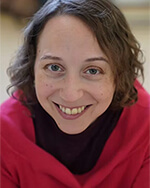
nili Broyer
nili Broyer is an academic director at the Center for Disabilities Studies, Paul Baerwald School of Social Work and Social Welfare, Hebrew University of Jerusalem. Her PhD in Disability Studies is from the University of Illinois at Chicago (UIC), where she was a recipient of the Ethel Louise Armstrong (ELA) Scholarship Award. Her main research interests include critical disability studies, cultural studies, disability art and culture, performance studies, feminist theory, autoethnography, and stigma.
Photo: ©Yoel Levy
[ direct link to episode | transcript ]
Are bugs kosher? What about CBD/THC edibles or Impossible Pork? Can entirely new substances - like lab grown meat - be categorized and certified? How does social justice interact with kosher restrictions?
In this episode, join host Erin Phillips and guest scholars Roger Horowitz, David Zvi Kalman, and Jordan D. Rosenblum as they seek answers to these questions and consider what those answers might mean for the future of kosher eating.
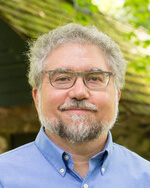
Roger Horowitz
Roger Horowitz is Director of the Center for the History of Business, Technology, and Society at the Hagley Library and Professor of History at the University of Delaware. His book Kosher USA: How Coke Became Kosher and Other Tales of Modern Food received the National Jewish Book Award in American Jewish Studies, the Dorothy Rosenberg award on the Jewish Diaspora from the American Historical Association and was named an Outstanding Academic Book by Choice magazine. His earlier books include Putting Meat on the American Table: Taste, Technology, Transformation and "Negro and White, Unite and Fight!" A Social History of Industrial Unionism in Meatpacking, 1930-1990. Horowitz also is active in professional organizations, currently serving as Treasurer of the Business History Conference, a trustee of the Jewish Historical Society of Delaware, and a member of the Scholarly Council of the American Jewish Historical Association. His current research focuses on the impact of Jewish preference for chicken on American foodways and the nation’s political economy.
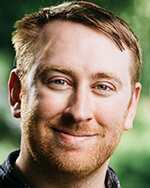
David Zvi Kalman
David Zvi Kalman is Scholar in Residence and Director of New Media at the Shalom Hartman Institute of North America, where he co-leads the research group on Judaism and the Natural World. He is the owner and operator of Print-O-Craft Press as well as KLMNOPS, a Jewish art house. Forthcoming publications include the Judaism chapter in the Cambridge Companion to Religion and Artificial Intelligence, as well as a chapter on Halakhah and Technology in the Oxford Handbook of Jewish Law. His current book project, based on his dissertation, is a history of the Jewish reception of timekeeping technology from the Bible to the 21st century.
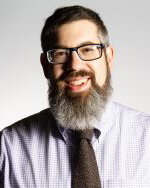
Jordan D. Rosenblum
Jordan D. Rosenblum is the Belzer Professor of Classical Judaism, the Max and Frieda Weinstein-Bascom Professor of Jewish Studies at the University of Wisconsin-Madison, and Chair of the Department of Art History. In 2009, he was a Starr Fellow at Harvard University. His research focuses on the literature, law, and social history of the rabbinic movement in general and, in particular, on rabbinic food regulations. He is the author of Rabbinic Drinking: What Beverages Teach Us About Rabbinic Literature; The Jewish Dietary Laws in the Ancient World; and Food and Identity in Early Rabbinic Judaism, as well as the co-editor of Feasting and Fasting: The History and Ethics of Jewish Food; Animals and the Law in Antiquity; With the Loyal You Show Yourself Loyal: Essays on Relationships in the Hebrew Bible in Honor of Saul M. Olyan; and Religious Competition in the Third Century C.E.: Jews, Christians, and the Greco-Roman World . Currently, he is working on a new book, provisionally entitled Jews and The Pig: A History, which will explore the long association between Jews and the pig, including visual representations (e.g., the Judensau).
[ direct link to episode | transcript ]
Following World War II, Jewish honor courts in Europe and criminal courts in Israel handled accusations of collaboration by Jews who were believed to have assisted the Nazis in some way. These trials were meant to heal communal wounds and rebuild trust, meting out social punishments. In this episode, guest scholars Dan Porat and Laura Jockusch discuss these honor courts, which until recently have been mainly a footnote in history.
This episode of Adventures in Jewish Studies is sponsored by The Herbert D. Katz Center for Advanced Judaic Studies, a research center at the University of Pennsylvania devoted to supporting new research in the study of Jewish history, culture and thought. The center's international fellowship program is currently focused on the study of Jews and legal culture, and the center is pleased to support an episode that speaks to that theme. For information about an upcoming summer school for graduate students in Jerusalem cosponsored by the Katz Center, see the Center's website: katz.sas.upenn.edu.
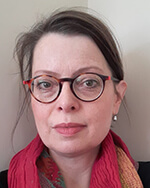
Laura Jockusch
Laura Jockusch is the Albert Abramson Associate Professor of Holocaust Studies at Brandeis University, where her research and teaching focus on the social, political, cultural, and legal histories of European Jews before, during, and after the Holocaust. Her ongoing research project investigates how Jews conceptualized revenge and justice after the Holocaust. She is the co-editor of Jewish Honor Courts: Revenge, Retribution and Reconciliation in Europe and Israel after the Holocaust (with Gabriel Finder). She is currently working on a book entitled The Trials of Stella Goldschlag: Nazi Victim, Holocaust Survivor, and War Criminal?
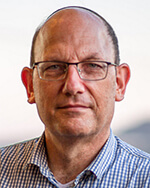
Dan Porat
Dan Porat is Unterberg Chair in Jewish Social and Educational History at the Hebrew University. His book, Bitter Reckoning: Israel Tries Holocaust Survivors as Nazi Collaborators (Harvard University Press/Belknap), was a 2019 Jewish Book Award finalist.
[ direct link to episode | transcript ]
We are currently in a sabbath, or shmita year, a biblically-mandated year of rest where fields lay fallow and debts are forgiven. From nearly the beginning, however, shmita has been more of an ideal, rather than a fully-observed year, and any practice was limited to Israel. In this episode, we consider the shmita's history and how this aspirational practice is being reinterpreted for the modern era with an emphasis on Jewish environmental consciousness across the diaspora.
The song Shir Hapalmach (Song Of The Palmach) by Leon Lishner and Friends heard in this episode is from the Free Music Archive. Find it here
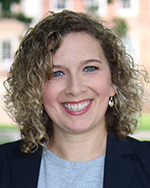
Adrienne Krone, PhD
Adrienne Krone is Assistant Professor of Religious Studies and Director of Jewish Life at Allegheny College. She has a Ph.D. in American Religion from Duke University. Her research focuses on food and farming practices in contemporary American religions. Her current project is an ethnographic and historical study of the Jewish community farming movement in North America.
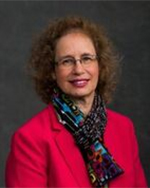
Hava Tirosh-Samuelson, PhD
Hava Tirosh-Samuelson (Ph.D. Hebrew University 1978) is Regents Professor of History, Irving and Miriam Lowe Professor of Modern Judaism, and Director of Jewish Studies at Arizona State University. An intellectual historian, she writes on Jewish philosophy and mysticism, religion, science, and technology, and religion and ecology. She is the editor of Judaism and Ecology: Created World and Revealed Word (2002) and the author of Religion and Environment: The Case of Judaism (2020) in addition to numerous essays on Judaism in reference books and anthologies devoted to religion and ecology.
[ direct link to episode | transcript ]
The story of Israeli pop music is a story of constant evolution, a reflection of Israel's complex and ever-changing history. From its pre-state origins, to music outside of the mainstream music industry, to its current more cosmopolitan and international feel, in this episode we look at the songs and music that have emerged from Israel across the decades.
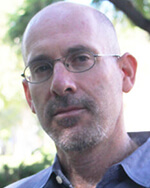
Uri Dorchin
Uri Dorchin is a cultural anthropologist who has held visiting positions at Washington University in St. Louis, the University of Colorado, and the University of California, Los Angeles. His research and teaching focus on the socio-cultural aspects of popular culture and music, ethnicity, and racial thinking, with recent research focused on Israeli rap and hip hop music. He is the author of the book Real Time: Hip-Hop in Israel/ Israeli Hip Hop and co-editor of Blackness in Israel: Rethinking Racial Boundaries.
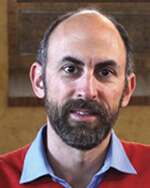
Daniel Stein Kokin
Daniel Stein Kokin is a Visiting Scholar at Arizona State University and has previously taught Jewish and Israel Studies at Yale, UCLA, the University of Oregon, and the University of Greifswald (Germany). He writes on Renaissance Humanism, Jewish-Christian relations, and modern Israel, and also develops academic presentations that synthesize scholarly lecture and dramatic performance, including the“Breach of Protocols: Revisiting Zion’s Elders” project.
[ direct link to episode | transcript ]
For decades, the rate of intermarriage among American Jews has been rising. Among many traditionally minded Jews and Jewish organizations, the number of Jews marrying outside the faith is cause for concern, calling into question the long-term viability of American Jewry. However, according to the recent Pew Research Center “Jewish Americans in 2020” study, nearly 50% of the children of interfaith couples identify as Jews. In this episode, we explore different ways of thinking about intermarriage and its implications for the future of American Jewry.
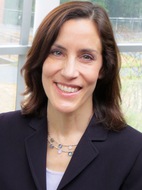
Keren R. McGinity, PhD
Keren R. McGinity teaches in the Brandeis University American Studies Program, is a Research Associate at the Hadassah-Brandeis Institute, and is the Interfaith Specialist at the United Synagogue of Conservative Judaism. She was the inaugural director of the Interfaith Families Jewish Engagement graduate program at Hebrew College. Dr. McGinity is the author of Still Jewish: A History of Women & Intermarriage in America, a National Jewish Book Award finalist, and Marrying Out: Jewish Men, Intermarriage, and Fatherhood, as well as many scholarly and popular articles.
[ direct link to episode | transcript ]
The first American bat mitzvah took place on March 18, 1922. As the 100th anniversary of this first bat mitzvah nears, guest scholars Carole Balin, Melissa R. Klapper, and Deborah Waxman consider the history of the bat mitzvah and its evolution over time. They also explore how the bat mitzvah helped pave the way for greater inclusion of women in public Jewish ritual and practice, and helped shape American Jewish life.
.jpg?Status=Master&sfvrsn=93155200_3)
Carole Balin, PhD
As a prolific writer and teacher, Rabbi Carole B. Balin, Ph.D. is known for her fresh ideas, authenticity, and way with words. She is the first woman to earn tenure at the NY campus of her alma mater, Hebrew Union College, where she is professor emerita of history. A Phi Beta Kappa graduate of Wellesley College, she earned a doctorate at Columbia University. Carole Balin is the Chair of the Jewish Women’s Archive board and speaks and publishes widely on gender and the Jewish experience. She co-curated the National Museum of American Jewish History’s exhibit, Bat Mitzvah Comes of Age. She is currently writing a narrative non-fiction about shifting American Jewish identity as told through the stories of bat mitzvah girls since the first in the United States in 1922. To contribute your bat mitzvah story, click here.
.jpg?Status=Master&sfvrsn=fa6f09b0_6)
Melissa R. Klapper, PhD
Dr. Melissa R. Klapper is Professor of History and Director of Women's & Gender Studies at Rowan University. She is the author of Jewish Girls Coming of Age in America, 1860-1920 (NYU, 2005); Small Strangers: The Experiences of Immigrant Children in the United States, 1880-1925 (Ivan R. Dee, 2007); and Ballots, Babies, and Banners of Peace: American Jewish Women's Activism, 1890-1940 (NYU, 2013), which won the National Jewish Book Award in Women's Studies. Her most recent book is Ballet Class: An American History (Oxford, 2020).
.jpg?Status=Master&sfvrsn=65eacf9e_3)
Deborah Waxman, PhD
The first woman rabbi to head a Jewish congregational union and a Jewish seminary, Rabbi Deborah Waxman, Ph.D., became president of Reconstructing Judaism in 2014. Since then, she has drawn on her training as a rabbi and historian to be the Reconstructionist movement’s leading voice in the public square. Website
[ direct link to episode | transcript ]
For this episode, we joined forces with Theatre Dybbuk to co-produce a special episode exploring Henry Ford’s publication of The International Jew: The World's Foremost Problem, a four volume series containing newspaper articles which were originally published from 1920–1922. These writings were based on – and included elements of – the notorious, fraudulent text “The Protocols of the Elders of Zion.”
Guest scholars Pamela Nadell and Lisa Leff examine the ways in which The International Jew intersected with historical antisemitism and the political forces of the time, and how its legacy is still having an impact today.
The episode was simultaneously released on both Adventures in Jewish Studies and theatre dybbuk’s The Dybbukast.

theatre dybbuk creates provocative new works that blend physical theatre with dance, poetry, and music for exciting, utterly singular live experiences. The company explores the rich world of Jewish folklore, rituals, and history, building lyrical performances that illuminate universal human experience for contemporary audiences. Through a combination of performed readings and interviews with artists and scholars, their podcast series, The Dybbukast, brings creative texts and their historical contexts to life, all while revealing their relationships to issues still present today. www.theatredybbuk.org
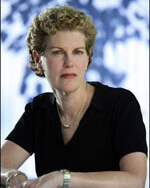
Pamela Nadell
Professor Pamela Nadell holds the Patrick Clendenen Chair in Women’s and Gender History at American University where she directs the Jewish Studies Program and received the university’s highest award, Scholar/Teacher of the Year. Her books include Women Who Would Be Rabbis: A History of Women’s Ordination, 1889-1985. A past president of the Association for Jewish Studies and the recipient of the American Jewish Historical Society’s Lee Max Friedman Award for distinguished service, her consulting work for museums includes the National Museum of American Jewish History and the Library of Congress. She is a fellow of the American Academy for Jewish Research.
Her recent book, America’s Jewish Women: A History from Colonial Times to Today (W.W. Norton, 2019) won the National Jewish Book Award – Everett Family Foundation Jewish Book of the Year.
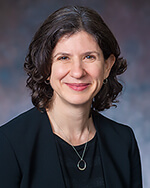
Lisa Leff
Lisa Leff is a professor at American University and a historian of European and Jewish history, specializing in the history of Jews in France. She is the author of Sacred Bonds of Solidarity: The Rise of Jewish Internationalism in Nineteenth Century France, Colonialism and the Jews, and The Archive Thief: the Man Who Salvaged French Jewish History in the Wake of the Holocaust, which received the 2016 Sami Rohr Prize for Jewish literature. She was named American University's 2017 Scholar-Teacher of the Year.
[ direct link to episode | transcript ]
If most of what you know about the history of Jews in Persia comes from the Book of Esther, when the wicked Haman (boo!) tried to massacre the Jewish population, you might get the idea that Persia was a place of great danger for Jews. And given the modern Iranian government's vehement anti-Israel rhetoric and support of Hezbollah, Hamas, and other terrorist groups that regularly attack the Jewish State, you might conclude that Jews and Persians are and always have been mortal enemies.
But the truth is more complex! In this episode guest scholars Lior Sternfeld and Galeet Dardashti explore the rich history of Jews in Persia from its ancient roots to the present day, to help bring to light the ways in which Jewish and Iranian life and culture have been and remain so deeply intertwined.
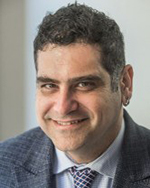
Lior Sternfeld
Lior Sternfeld, PhD, is an assistant professor of history and Jewish Studies at Penn State University. His is a social historian of the modern Middle East with particular interests in the histories of the Jewish people and other minorities of the region. His first book, titled Between Iran and Zion: Jewish Histories of Twentieth-Century Iran (Stanford University Press, 2018), examines, against the backdrop of Iranian nationalism, Zionism and constitutionalism, the development and integration of Jewish communities in Iran into the nation-building projects of the last century. He is currently working on two book projects: "The Origins of Third Worldism in the Middle East" and a new study of the Iranian-Jewish Diaspora in the U.S. and Israel. He teaches on the modern Middle East, Iran, Jewish histories of the region, and Israel-Palestine related classes.
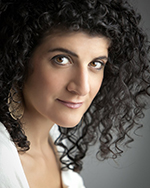
Galeet Dardashti
As both anthropologist and performer/composer Dr. Galeet Dardashti, PhD, has earned a reputation as a trail-blazing performer, educator and advocate of Middle Eastern Jewish culture. As a scholar, her publications examine Israeli music/media, Mizrahi cultural politics, and the political economy of philanthropy; she is currently completing a book on the Mizrahi piyyut (sacred song) phenomenon in Israel. Dardashti has held postdoctoral fellowships at NYU and Rutgers and most recently was Assistant Professor of Jewish Music/Musician in Residence at the Jewish Theological Seminary. Her research as Affiliated Fellow at University of Pennsylvania’s Katz Center in 2020/21 examines a nascent movement of young liberal “Mizrahi” North American Jews. As a performer/composer, Dardashti is widely known as leader/founder of the all-woman Middle Eastern ensemble Divahn, and through her multi-disciplinary commissions The Naming and Monajat; she will be recording Monajat as the Artist-in-Virtual-Residence at Indiana University’s Jewish Studies Program in spring 2021.
[ direct link to episode | transcript ]
"If you harm the environment, you harm yourself.”
This mini-episode of the Adventures in Jewish Studies podcast series asks the question “Is there a Jewish environmental ethic?” Guest scholar Tanhum Yoreh considers the“New Year of the Trees” holiday Tu Bishvat, and the concept of “bal taschit,” which prohibits wastefulness and destruction, with regard to Jewish environmentalism and ethics.
.jpg?sfvrsn=5e3d9106_2)
Tanhum Yoreh
Tanhum Yoreh, PhD, is an Assistant Professor at the School of the Environment at the University of Toronto. His research focuses on religion and environment, faith-based environmentalism, Jewish environmentalism, faith-based environmental ethics, and religious legal approaches to environmental protection. He is particularly interested in the themes of wastefulness, consumption, and simplicity. Dr. Yoreh is currently researching environmental engagement in faith communities in Canada, the United States, and Israel. He is the author of Waste Not: A Jewish Environmental Ethic. Website
[ direct link to episode | transcript ]
Since the 1930s, around 70% of American Jews have consistently voted Democrat. In earlier decades, however, the Jewish vote was spread widely across the American political spectrum. In this episode, we explore why the overwhelming majority of American Jews have come to support the Democrats.
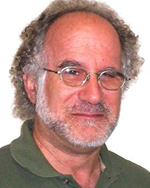
Kenneth Wald
Kenneth Wald, PhD, is a Distinguished Professor in the Department of Political Science at the University of Florida. He has written about the relationship of religion and politics in the United States, Great Britain, and Israel. His most recent books include The Politics of Cultural Differences: Social Change and Voter Mobilization Strategies in the Post-New Deal Period (co-authored) and Religion and Politics in the United States (4th ed.). His articles have appeared in the American Political Science Review, Journal of Politics, American Journal of Political Science, British Journal of Political Science, Social Science Quarterly, and many other journals.
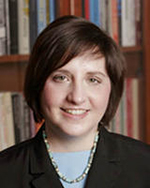
Beth S. Wenger
Beth S. Wenger, PhD, is Moritz and Josephine Berg Professor of History at the University of Pennsylvania where she serves as Chair of the History Department. A specialist in American Jewish history, Wenger's interests also include European Jewish culture, American religion and ethnicity, and cultural, social and gender history. Wenger’s most recent book is a co-edited anthology titled Gender in Judaism and Islam: Common Lives, Uncommon Heritage. She is also the author of History Lessons: The Creation of American Jewish Heritage, New York Jews and the Great Depression: Uncertain Promise, and The Jewish Americans: Three Centuries of Jewish Voices in America. Wenger has published numerous scholarly articles, including contributions to the journals American Jewish History, Jewish Social Studies, the Journal of Women's History, as well as several essays in collected volumes and anthologies.
[ direct link to episode | transcript ]
For many people, the narrative about Black-Jewish relations goes something like this: In the 1960s, there was a strong alliance between the two groups, perfectly encapsulated by the image of Martin Luther King, Jr. and Rabbi Abraham Joshua Heschel walking arm-in-arm on the civil rights march from Selma, Alabama. Then, with the rise of black nationalism, that relationship started to break down. But what if that isn't the whole story? In this episode, we complicate that narrative, tracing the history of Black-Jewish relations from the early twentieth century to today.
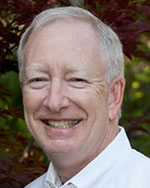
Marc Dollinger
Marc Dollinger, PhD, holds the Richard and Rhoda Goldman Endowed Chair in Jewish Studies and Social Responsibility at San Francisco State University. Professor Dollinger is author of four scholarly books in American Jewish history, most recently Black Power, Jewish Politics: Reinventing the Alliance in the 1960s. He has published entries in the Encyclopedia Judaica, the Encyclopedia of Antisemitism, and the Encyclopedia of African American Education. His next project traces his own experience fighting campus antisemitism at both right-wing and left-wing universities. Professor Dollinger has spoken about his research on Don Lemon’s CNN-podcast Silence Is Not an Option, as well as the NFL Network and ESPN. Just for fun, Dr. Dollinger helped actress Helen Hunt learn about her Jewish roots on the prime-time NBC show Who Do You Think You Are?.
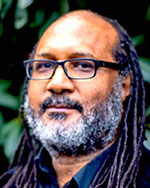
Lewis R. Gordon
Lewis R. Gordon, PhD, is an Afro-Jewish philosopher, political thinker, educator, and musician and Professor and Head of the Philosophy Department at UCONN-Storrs, where he also has affiliations in Judaic Studies, Caribbean and Latinx Studies, Asian and Asian American Studies, Women’s, Gender, and Sexuality Studies, and Global Studies. He is the author of sixteen influential and award-winning monographs and anthologies. His forthcoming books are Freedom, Justice, and Decolonization, 论哲学、去殖民化与种族 (“On Philosophy, Decolonization, and Race”), trans. Li Beilei, and Fear of Black Consciousness. He co-edits the book series Global Critical Caribbean Thought and the journal Philosophy and Global Affairs. He is Honorary President of the Global Center for Advanced Studies and a former president of the Caribbean Philosophical Association, for which he now serves as its chairperson of awards and global collaborations.
[ direct link to episode] | transcript ]
Since the 1920s, American Jewish kids have spent many summers at Jewish summer camp. But how and why did sleepaway camp become such a staple of American Jewish life? In this episode we explore the history of American Jewish summer camp and its promise of providing an immersive Jewish experience.
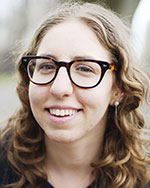
Sandra Fox
Sandra Fox is a historian of American Jewry, youth, and Yiddish culture. A Jim Joseph Postdoctoral Fellow in education and religion at Stanford University, her book-in-progress research considers the lived experience and intergenerational tension in postwar American Jewish summer camps. She is also the founder and executive producer of Vaybertaytsh: A Feminist Podcast in Yiddish, and serves as a peer review editor at In geveb: A Journal of Yiddish Studies.
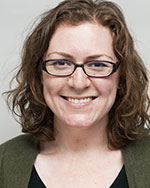
Nicole Samuel
Nicole Samuel is Associate Research Scientist at the Cohen Center for Modern Jewish Studies at Brandeis University. She is the co-author of a variety of publications, including Advancing Jewish Retreating and Innovating JCCs. Her work focuses on Jewish institutions and their role in supporting Jewish life and community. She has conducted several studies of Jewish life and Israel education at overnight camp with her colleague Amy L. Sales, including Limud by the Lake Revisited: Growth and Change at Jewish Summer Camp. Currently, she is the lead investigator on the evaluation of Hillel International’s Springboard Fellowship. She received her MA in Near Eastern and Judaic Studies and Women's Studies from Brandeis University, concentrating in Contemporary Jewish Life, and earned a BA in History magna cum laude from American University in Washington, DC.
[ direct link to episode | transcript ]
On Shavuot, a Jewish holiday celebrating the people of Israel receiving the Torah from God at Mt. Sinai, we the read the Book of Ruth, the story of a Moabite woman, Ruth, who marries an Israelite man and, when he dies, remains loyal to her mother-in-law, Naomi, and returns with her to Judea. So, why do we read this story on Shavuot? It may have something to do with Ruth the Moabite being considered (however erroneously) the first ever convert to Judaism.
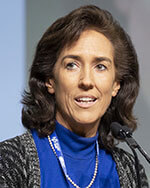
Christine Hayes
Christine Hayes, PhD, is the Robert F. and Patricia R. Weis Professor of Religious Studies in Classical Judaica at Yale University, and the immediate past president of the AJS. Her published works include several books and many articles in Vetus Testamentum, The Journal for the Study of Judaism, The Harvard Theological Review, and various scholarly anthologies. Her most recent book, What’s Divine about Divine Law? Early Perspectives, received the 2015 National Jewish Book Award in Scholarship, a 2016 PROSE award for best book in Theology and Religious Studies from the American Publishers Association, and the 2016 Jordan Schnitzer Award.
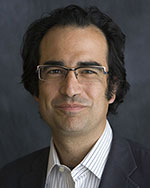
Ronnie Perelis
Ronnie Perelis, PhD, is the Chief Rabbi Dr. Isaac Abraham and Jelena (Rachel) Alcalay Associate Professor of Sephardic Studies at the Bernard Revel Graduate School of Jewish Studies of Yeshiva University. His research explores connections between Iberian and Jewish culture during the medieval and early modern periods. His essays on Sephardic history investigate the dynamics of religious transformation within the context of the crypto-Jewish experience. His most recent book, Blood and Faith, explores family and identity in the Sephardic Atlantic world.
[ direct link to episode | transcript ]
The Passover Haggadah is among the most popular and fascinating texts in the Jewish liturgy. There's a Haggadah for every for sensibility and persuasion, from those steeped in orthodox tradition to seder celebrants wanting to craft a ritual reflecting modern times. But where did the Haggadah come from? Why do we ask four questions? What's the origin of the wise, wicked, simple, and too-young-to-ask children? What about Dayenu, Hag Gad Ya, and other favorite Passover songs?
In this episode, we explore the origins and evolution of the Haggadah, from the final decades of the Second Temple, through the Middle Ages, and up through modern times. As we explore this incredible history, we reveal how, when, and why the Haggadah was brought to life and why it's continued to remain such an evocative and supple book.
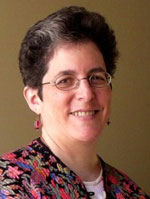
Ruth Langer
Ruth Langer is Professor of Jewish Studies in the Theology Department at Boston College and Associate Director of its Center for Christian-Jewish Learning. She received her PhD. in Jewish Liturgy in 1994 and her rabbinic ordination in 1986 from Hebrew Union College - Jewish Institute of Religion in Cincinnati. She writes and speaks in two major areas: the development of Jewish liturgy and ritual and Christian-Jewish relations. Her books include, Cursing the Christians? A History of the Birkat HaMinim (2012), To Worship God Properly: Tensions between Liturgical Custom and Halakhah in Judaism (2005), and Jewish Liturgy: A Guide to Research (2015). She also co-edited Liturgy in the Life of the Synagogue (2005) and has published a long list of articles.
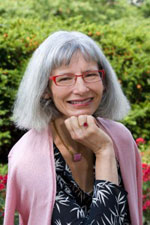
Vanessa Ochs
Rabbi Vanessa Ochs, PhD, is Professor in the Department of Religious Studies at the University of Virginia and a core member of the Jewish Studies Program since its inception. In her research, she investigates new Jewish ritual, Jewish feminism, the Passover Haggadah, Jewish material culture, and Jewish Sensibilities. Her books include The Passover Haggadah: A Biography (2020), Inventing Jewish Ritual (winner of a 2007 National Jewish Book Award), Sarah Laughed, The Jewish Dream Book (with Elizabeth Ochs), Words on Fire: One Woman’s Journey into the Sacred, and Safe and Sound: Protecting Your Child In An Unpredictable World.
[ direct link to episode | transcript ]
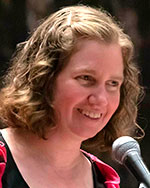
Sarah Bunin Benor
Sarah Bunin Benor, PhD, is Professor of Contemporary Jewish Studies at Hebrew Union College–Jewish Institute of Religion. She received her Ph.D. from Stanford University in Linguistics in 2004. Her recent books include Languages in Jewish Communities, Past and Present (De Gruyter Mouton, 2018) and Hebrew Infusion: Language and Community at American Jewish Summer Camps (Rutgers University Press, 2020). She is founding co-editor of the Journal of Jewish Languages and creator of the Jewish Language Website and the Jewish English Lexicon. Her current projects analyze Hebrew use at Jewish supplementary schools and the names American Jews give their children and their pets.
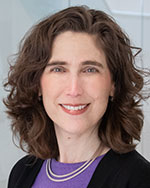
Alanna Cooper
Alanna Cooper, PhD, is a cultural anthropologist. She serves as the Abba Hillel Silver Chair in Jewish Studies at Case Western Reserve University. Her first book Bukharan Jews and the Dynamics of Global Judaism was published with Indiana University Press in 2013. Her current book project, Preserving and Disposing of the Sacred: America’s Jewish Congregations, examines the ways communities acquire, use, maintain and deaccession their material possessions.
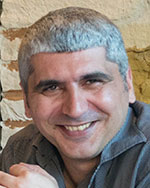
Vitaly Shalem
A graduate of Tel Aviv University, VItaly Shalem is a computational linguist and NLP specialist currently serving as a Principal Language Engineer at Cerence, Inc. in Belgium. Born in the Northern Caucasus region of Russia, Vitaly is native to the Judeo-Tat (Juhuri) speaking community and identifies himself as a semi-speaker of the language. In his free time, he is an independent scholar and expert on Judeo-Tat.
[ direct link to episode | transcript ]
Do you love The Marvelous Mrs. Maisel? Our latest podcast episode focuses on the life of 1950s Jewish American female comedian Jean Carroll, the Mrs. Maisel of her day. Learn about this trailblazing performer in this episode filled with lively comedic routines and scholarly insight.
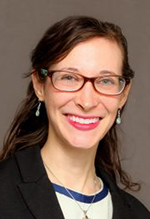
Grace Kessler Overbeke
Grace Kessler Overbeke is Perilman Postdoctoral Fellow at the Center for Jewish Studies at Duke University. She works at the intersection of Jewish Studies and Theatre Studies. Dr. Overbeke received her MA and PhD from Northwestern University's Interdisciplinary Theatre and Drama program, and her BA in Theatre and English from Wesleyan University. She has published in Theatre Journal, Theatre Survey, Studies in American Humor, the New England Theatre Journal, Theatre Topics, and The Jewish Forward. In addition to being a scholar of theatre, she is also a practicing dramaturg and director. After her year of postdoctoral work at Duke, Dr. Overbeke will join the faculty at Columbia College Chicago.
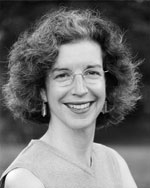
Riv-Ellen Prell
Riv-Ellen Prell is Professor Emerita of American Studies at the University of Minnesota . Among her publications are Gender, Class and Jewishness: New Approaches to the Study of Identity (2011), Fighting to Become Americans: Jews, Gender, and the Anxiety of Assimilation and Prayer and Community: The Havurah in American Judaism. Her edited volumes include Women Remaking American Judaism and Interpreting Women’s Lives: Personal Narratives and Feminist Theory. Dr. Prell received a BA from the University of Southern California and a MA and PhD from the University of Chicago.
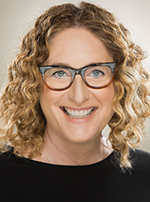
Judy Gold
Judy Gold is a comedian who has had stand-up specials on HBO, Comedy Central and LOGO. She has written and starred in two critically acclaimed, Off-Broadway shows: The Judy Show – My Life as a Sitcom and 25 Questions for a Jewish Mother. TV appearances include guest-starring roles on Broad City, Louie, The Unbreakable Kimmy Schmidt, The Jim Gaffigan Show, Inside Amy Schumer, Difficult People, 30 Rock, and 2 Broke Girls. She is also the host of the hit podcast, Kill Me Now, on iTunes, and has a new comedy album by the same name. You can find her at JudyGold.com or follow her on Twitter and Instagram – @jewdygold.
[ direct link to episode | transcript ]
Since the late Second Temple period, starting in the second century BCE, messianic figures began appearing in Roman-controlled Judea. The idea of the messiah, a divinely anointed person who will arrive and redeem the world and restore the lost tribe of Israel to the promised land, has been a central part of traditional Judaism since the time of Maimonides, who in the twelfth century made belief in the coming of the messiah a core tenet of his Thirteen Principles of Faith. In this episode. we explore the messianic concept in Jewish history and thought, from the time of the Bar Kohba rebellion in 132 CE to the messianic fervor surrounding Chabad Lubavitch rebbe Menachem Mendel Schneerson in recent times.

David Berger, PhD
David Berger, PhD, was President of the Association for Jewish Studies from 1998 to 2000, and is the Ruth and I. Lewis Gordon Professor of Jewish History and Dean at the Bernard Revel Graduate School of Jewish Studies, Yeshiva University. His books include The Jewish-Christian Debate in the High Middle Ages, the co-authored Judaism’s Encounter with Other Cultures: Rejection or Integration?, and The Rebbe, the Messiah, and the Scandal of Orthodox Indifference, as well as two volumes of collected essays on Jewish-Christian relations and the intellectual history of the Jews.

Laura Arnold Leibman, PhD
Laura Arnold Leibman, PhD, is Professor of English and Humanities at Reed College. Her publications include Indian Converts; Messianism, Secrecy and Mysticism: A New Interpretation of Early American Jewish Life, which won a National Jewish Book Award, a Jordan Schnitzer Book Award from the Association for Jewish Studies, and was selected as one of Choice’s Outstanding Academic Titles for 2013; and Jews in the Americas, 1776-1826. Her research and teaching interests address material religion, Jewish Studies, and early American studies. Her latest book The Art of the Jewish Family: A History of Women in Early New York in Five Objects will be available in Spring 2020.

Kenneth Seeskin, PhD
Kenneth Seeskin, PhD, is Professor of Philosophy and Philip M. and Ethel Klutznick Professor of Jewish Civilization at Northwestern University. He received his PhD in philosophy from Yale University in 1972 and has been at Northwestern ever since. He specializes in the rationalist tradition in Jewish philosophy with an emphasis on Maimonides. Publications include Maimonides on the Origin of the World, Jewish Messianic Thoughts in an Age of Despair, and Thinking about the Torah: A Philosopher Reads the Bible.
[ direct link to episode | transcript ]
The season one finale of Adventures in Jewish Studies tackles the challenging and complex issues of Jewish identity, whiteness, and anti-Semitism in America. This episode traces the history of Ashkenazi Jews in the U.S. from the turn of the century to the present day, looking at how Jews have been on the margins of whiteness, often victims of anti-Semitism and white supremacy, but also later occupying places of privilege within whiteness as they assimilated into white, mainstream America.
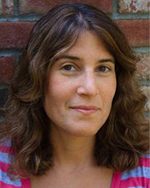
Lila Corwin Berman, PhD
Lila Corwin Berman, PhD, is Professor of History at Temple University, where she holds the Murray Friedman Chair of American Jewish History and directs the Feinstein Center for American Jewish History. She is completing a book called The American Jewish Philanthropic Complex: The History of a Multi-Billion Dollar Institution and is author of Speaking of Jews: Rabbis, Intellectuals, and the Creation of an American Public Identity (2009) and Metropolitan Jews: Politics, Race, and Religion in Postwar Detroit (2015). Her articles have appeared in several publications, including the American Historical Review, Journal of American History, AJS Review, Jewish Social Studies, American Jewish History, Religion and American Culture, the Washington Post, and the Forward.
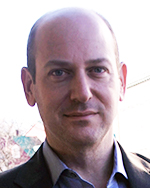
Eric L. Goldstein, PhD
Eric L. Goldstein, PhD, is the Judith Evans London Director of the Tam Institute for Jewish Studies at Emory University, where he is also Associate Professor of History and Jewish Studies. He is the author of The Price of Whiteness: Jews, Race, and American Identity (2006); and, with Deborah R. Weiner, On Middle Ground: A History of the Jews of Baltimore (2018). From 2007 to 2012 he was editor of the scholarly journal American Jewish History. His current project is a history of the reading culture of Eastern European Jews in America during the era of mass migration.
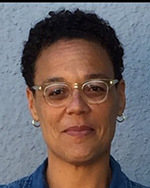
Ilana Kaufman
Ilana Kaufman is the Director of the Jews of Color Field Building Initiative, a national project housed at the Leichtag Foundation. Previously she was the Public Affairs and Civic Engagement Director, East Bay for the Jewish Community Relations Council of San Francisco. As a guest on NPR’s Code Switch, with pieces featured in eJewish Philanthropy and The Foundation Review, and an ELI Talk titled “Who Counts? Race and the Jewish Future” with 16,000 views, she is passionate about all things at the intersection of Jewish community/racial justice/Jews of color/education/philanthropy. She is a Senior Schusterman Fellow who received her BA in sociology from California State University-Humboldt, and her MA in educational pedagogy from Mills College.
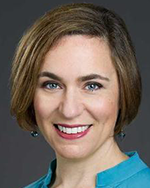
Judith Rosenbaum
Judith Rosenbaum, PhD, is Executive Director of the Jewish Women’s Archive, a national organization that documents Jewish women’s stories, elevates their voices, and inspires them to be agents of change. A writer, educator, and historian, Judith earned her doctorate in American Studies from Brown University. She teaches and lectures widely on Jewish studies and women’s studies and serves on the faculty of the Bronfman Youth Fellowships.
[ direct link to episode | transcript ]
Fifty years ago, Philip Roth's wildly controversial and hugely successful novel Portnoy's Complaint was published. A bestseller, the novel – written as the confession of a patient to his psychoanalyst – tells the story of Alexander Portnoy, a thirty-something American Jew. Portnoy is struggling to break free from his overbearing Jewish mother and the crushing guilt and anxiety that threaten to overwhelm him as he does everything he can to stake out his sexual freedom (including, as a boy, masturbating into a piece of liver that his mother later cooks and serves for dinner). This episode tells the story of Portnoy's Complaint – how and why Roth wrote it, the controversy and harsh criticism it generated among the Jewish establishment, and how literary critics have read and analyzed the novel in the decades since its publication.
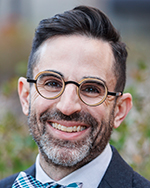
Warren Hoffman, PhD
Warren Hoffman is the Executive Director of the Association for Jewish Studies. Previously, he was the Associate Director of the Center of Jewish Life and Learning at Jewish Federation of Greater Philadelphia, and he also served over five years as the Senior Director of Programming at the Gershman Y where he innovated numerous new programs and was named the "next wave" of Jewish culture by the Jewish Exponent. In the world of theater, Warren was the literary manager and dramaturg for Philadelphia Theatre Company where he researched and developed multiple world premieres by writers including Terrence McNally, Chris Durang, and Bill Irwin. In addition to working in the theater community, Hoffman holds a Ph.D. in American Literature from the University of California-Santa Cruz. He earned rave reviews for his book The Passing Game: Queering Jewish American Culture published by Syracuse University Press. His most recent book is The Great White Way: Race and the Broadway Musical, which is coming out in a revised second edition in February 2020. Learn more about Warren at Warrenhoffman.com.
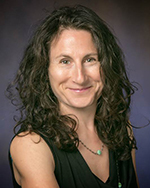
Brett Ashley Kaplan, PhD
Brett Ashley Kaplan earned her Ph.D. through the Rhetoric Department at the University of California, Berkeley and is now the Director of the Initiative in Holocaust, Genocide, Memory Studies and Professor in the Program in Comparative and World Literature at the University of Illinois. Her books, Unwanted Beauty: Aesthetic Pleasure in Holocaust Representation (2007) and Landscapes of Holocaust Postmemory (2011), examine the Shoah’s intersections with art and space. Turning to race and power in contemporary Jewish American literature, she published Jewish Anxiety in the Novels of Philip Roth (2015). She is at work on Convergences: Blackness and Jewishness in Contemporary Literature, Visual, and Performance Arts and Rare Stuff. In addition to scholarly articles and book reviews she has written for outlets such as The Conversation, and has been interviewed on NPR and The 21st.
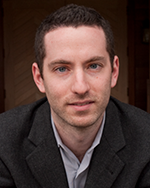
Josh Lambert, PhD
Josh Lambert is the Academic Director of the Yiddish Book Center, and teaches American literature at the University of Massachusetts, Amherst. His most recent book is Unclean Lips: Obscenity, Jews, and American Culture (2014), and his reviews and essays have been published by the New York Times Book Review, the Los Angeles Review of Books, Haaretz, Tablet, and the Forward.
[ direct link to episode | transcript ]
Between 1948 and 1954, several thousand babies born to Mizrahi immigrants to Israel were separated from their parents and were claimed by Ashkenazi authorities to have mysteriously and suddenly died. Was this really the case or was this part of a larger conspiracy affecting Mizrahi Jews from Yemen, Iraq, and other parts of Africa, Asia, and the Middle East? This episode of Adventures in Jewish Studies looks at these disappearances, known as the Yemenite Children Affair, to illustrate the story of the Mizrahi Jewish experience in the development of Israel.
The state of Israel was created as a safe haven for world Jewry, and Jews from all corners of the world came together to form a new and harmonious society. In reality, though, Israeli society was far from unified. From its earliest days, modern Israeli society was divided by ethnic tensions between Jews of European origins (Ashkenazim), who controlled the Zionist establishment, and Jews of North African, Middle Eastern, and Asian origins (Mizrahim), who were relegated to second-class status.
Join host Jeremy Shere and Jewish Studies guest scholars as they discuss the Mizrahi struggle for civil rights in the Jewish state – from the Yemenite Children Affair to the Wadi Salib riots, from the Israeli Black Panther Protests to the ongoing efforts of the Mizrahim to participate as full members of Israeli society.
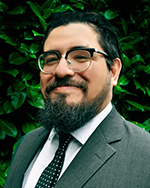
Vincent Calvetti-Wolf
Vincent Calvetti-Wolf is a PhD student in the Interdisciplinary Near and Middle Eastern Studies Program at the University of Washington. His research explores the histories and politics of social movements led by Mizrahi Jews in Israel. He is the 2018-2019 Mickey Sreebny Memorial Scholar at the Stroum Center for Jewish Studies and the 2018-2019 Bank of America Endowed GO-MAP Fellow at the University of Washington Graduate School. Vincent is graduate student coordinator of the Israel/Palestine Research Colloquium and a member of the Israel Studies Advisory Committee.
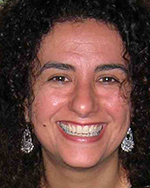
Shoshana Madmoni-Gerber, PhD
Shoshana Madmoni-Gerber, PhD, is an Associate Professor of communication and journalism at Suffolk University in Boston. She has a PhD in communication from the University of Massachusetts at Amherst, and a master’s degree in communication and journalism from Hebrew University in Jerusalem. Her book, Israeli Media and the Framing of Internal Conflict: The Yemenite Babies Affair was published in 2009.
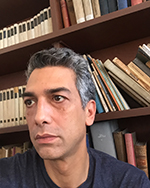
Avi Shilon, PhD
Avi Shilon, PhD, is a historian who specializes in the field of Israel Studies. His dissertation focuses on The Revisionist Movement Leaders' Attitudes Toward Jewish Religion 1925-2005. His first book, Menachem Begin: A Life, was published in 2012. His second book, Ben Gurion: His Later Years in the Political Wilderness had been published in 2016. His new book, The Decline of the Left-Wing in Israel: Yossi Beilin and the Politics of the Peace Process will be later this year. Shilon teaches at NYU Tel Aviv Campus and at the Hebrew University. He also writes op-ed columns for Haaretz.
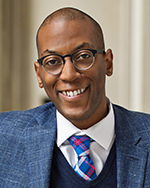
Bryan K. Roby, PhD
Bryan K. Roby, PhD, is an Assistant Professor of Judaic Studies at the University of Michigan – Ann Arbor. His expertise is on Middle Eastern and North African Jewish history in the modern era. His research interests include the intersections of race, gender, and sexuality in Israel/Palestine; 19th and 20th century North African history; and the legacy of French colonialism on Arab and Jewish identity. His first book, The Mizrahi Era of Rebellion: Israel’s Forgotten Civil Rights Struggle 1948-1966 (2015), provides an extensive history of social justice protests by Middle Eastern Jews in Israel. He is working on a second book project, Israel through a Colored Lens, that explores the how and why Mizrahim became “Black” in Israel through the shifting boundaries of racial constructs in Israel/Palestine as well as African-American intellectual contributions to Israeli sociology and theories on race and ethnicity.
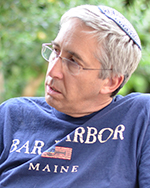
Yaacov Lozowick, PhD
Yaacov Lozowick, PhD, served as Director of Israel's National Archives from 2011 to 2018. Previously to that he ran the archives at Yad Vashem for 14 years. An historian by training, he is the author of Hitler's Bureaucrats, The Nazi Security Police and the Banality of Evil, and Right to Exist, A Moral Defense of Israel's Wars. He teaches information science at Bar Ilan University, and is writing a history of Israel's settlements.
[ direct link to episode | transcript ]
Where do Jews come from?
That’s the big question we’re asking in the second episode of the Adventures in Jewish Studies podcast, and we’re turning to the fields of history, archaeology, linguistics, and genetics in our search to solve the mystery of Judaism’s roots.
Join host Jeremy Shere and his Jewish Studies experts as they discuss the intriguing origins of the Jews.
And once you’ve listened to scholars tackle this episode’s big question, take a break and engage the senses in the first episode of Adventures in Jewish Studies – on the American New York Jewish food tradition of Appetizing.
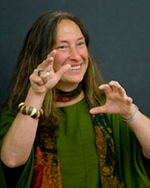
Cynthia Baker
Cynthia Baker, PhD, is a professor at Bates College in Maine where she chairs the department of Religious Studies and teaches courses in Judaism and early Christianity - several of which are cross-listed in Gender and Sexuality Studies. Her first book, Rebuilding the House of Israel: Architectures of Gender in Jewish Antiquity, was published by Stanford University press in 2002. Her recent book, Jew, published in the Key Words in Jewish Studies series from Rutgers University Press, explores the category Jew from its earliest appearances in antiquity through its more recent uses in the science of genomics.
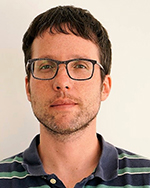
Ofri Ilany
Ofri Ilany, PhD, is a historian and a Polonsky postdoctoral fellow at the Van Leer Institute, Jerusalem. His book, In Search of the Hebrew People: Bible and Nation in the German Enlightenment was published recently by Indiana University Press. Dr. Ilany’s research interests include the history of Orientalism and Bible research and the history of sexuality. His column, "Under the Sun," is published at Haaretz Weekly Supplement.
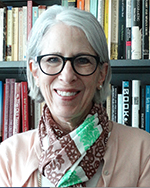
Beth Alpert Nakhai
Beth Alpert Nakhai, PhD, is an associate professor in the Arizona Center for Judaic Studies at the University of Arizona. She received her MTS from Harvard Divinity School, and her MA and PhD from the University of Arizona. Her research focuses on Canaanite and Israelite religion and on the lives of women in antiquity; her books include Archaeology and the Religions of Canaan and Israel, and several edited and co-edited volumes. She is currently working on a book about women in the field of Near Eastern archaeology. She served on the Board of Directors of the American Schools of Oriental Research for twelve years and chairs its Initiative on the Status of Women. She is a Board officer for the W. F. Albright Institute of Archaeological Research in Jerusalem, serving as its secretary.
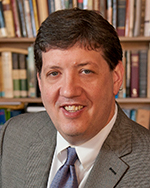
Steven Weitzman
Steven Weitzman, PhD, serves at the Abraham M. Ellis Professor of Hebrew and Semitic Languages and Literatures and Ella Darivoff Director of the Herbert D. Katz Center of Advanced Judaic Studies at the University of Pennsylvania. A scholar of Jewish antiquity, recent publications include The Jews: A History, coauthored with John Efron and Matthias Lehmann (3rd edition, 2019); a biography of King Solomon published as part of the “Jewish Lives” series from Yale University Press; and The Origin of the Jews: the Quest for Roots in a Rootless Age (Princeton University Press, 2017), a recipient of a National Jewish Book Award. Weitzman previously taught at Indiana University and Stanford University.
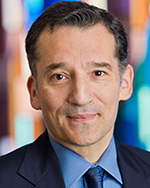
David Wolpe
David Wolpe is the Max Webb Senior Rabbi of Sinai Temple, and was named one of the 500 Most Influential People in Los Angeles in 2016 and 2017, Most Influential Rabbi in America by Newsweek, and one of the 50 Most Influential Jews in the World by The Jerusalem Post. Rabbi Wolpe previously taught at the Jewish Theological Seminary, the American Jewish University, Hunter College, and UCLA. A columnist for Time.com, he has been published and profiled in The New York Times, Los Angeles Times, Washington Post’s On Faith website, The Huffington Post, and the New York Jewish Week. He has been featured on The Today Show, Face the Nation, ABC This Morning, and CBS This Morning. In addition, Rabbi Wolpe has appeared prominently in series on PBS, A&E, the History Channel, and the Discovery Channel. Rabbi Wolpe is the author of eight books, including the national bestseller Making Loss Matter: Creating Meaning in Difficult Times. His new book is titled David, the Divided Heart. It was a finalist for the National Jewish Book Awards, and has been optioned for a movie by Warner Bros.
[ direct link to episode | transcript ]
In the inaugural episode of Adventures in Jewish Studies, host Jeremy Shere explores the New York Jewish food tradition of “appetizing” with guests culinary ethnographer Eve Jochnowitz, NYU history professor Hasia Diner, former 3rd generation owner of the appetizing store Russ & Daughters Mark Russ Federman, and Concordia University professor of religions and cultures Norma Joseph.
Appetizing is a distinctly American, distinctly New York, distinctly Jewish, food tradition. Introduced as a counterpart to the meat-selling deli, and carrying fish, dairy, and related foods, appetizing stores have been around since the early 1900s. Appetizing played an important role in the history of Jewish foods and is an integral part of the story of Jewish New Yorkers – how they lived, how they ate, and how they evolved.
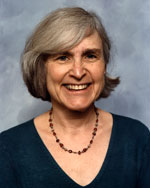
Hasia Diner, PhD
Hasia Diner, PhD, is the Paul and Sylvia Steinberg Professor of American Jewish History at New York University, with a joint appointment in the departments of history and the Skirball Department of Hebrew and Judaic Studies. She is also the Director of the Goldstein Goren Center for American Jewish History. Dr. Diner’s books include Lower East Side Memories: The Jewish Place in America and Hungering for America: Italian, Irish, and Jewish Foodways in the Age of Migration.
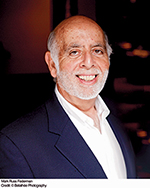
Mark Russ Federman
Mark Russ Federman was the third generation of the Russ Family to own and operate Russ & Daughters, the family appetizing store. He ran the store from behind the counter for over three decades; now retired, he considers himself “herring maven emeritus.” When he is not schmoozing across the counter, Mr. Federman writes and lectures about his store, products, and family. He is the author of Russ & Daughters; Reflections and Recipes from the House that Herring Built, and his essays are included in Gastropolis: Food & New York City and Savoring Gotham. Mr. Federman’s daughter and nephew currently own and operate Russ & Daughters.
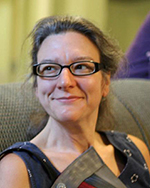
Eve Jochnowitz, PhD
Eve Jochnowitz, PhD, is a Yiddish instructor at the YIVO Institute and the Workmen’s Circle who has been teaching Yiddish language, culture, literature, foodways and dance for 25 years. She lectures internationally on food in Jewish tradition, religion, and ritual, as well as food in Yiddish performance and popular culture. She blogs in English and Yiddish at inmolaraan.blogspot.com, and co-hosts the Yiddish cooking show Est Gezunterheyt!. She translated, annotated, and adapted for the modern kitchen The Vilna Vegetarian Cookbook in 2015. She holds a PhD in Jewish culinary ethnography from the NYU Department of Performance Studies, and worked as a cook and baker for several years in New York City. Dr. Jochnowitz is the chocolate lady.
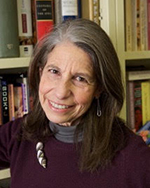
Norma Joseph, PhD
Norma Baumel Joseph, PhD, teaches in the Department of Religions and Cultures of Concordia University, Montreal. She developed and supervised the Women and Religion specialization and is an Associate of the Institute for Canadian Jewish Studies. She was the founding co-director and is currently Associate Director of the Azrieli Institute for Israel Studies. She has been the chair of the national Canadian Jewish Archives since the 1990s, and has been a columnist for Canadian Jewish News for the past decade. Dr. Joseph is a specialist in women and Judaism, their historical experience and the legal texts that encompass them, as well as food, identity, and gender. She has edited a collection on gender, food and survival in Judaism for the journal Nashim, and is currently publishing a series of articles on food, identity, and gender, especially locating the ethnic eating of Iraqi Jews.
Introduction to Adventures in Jewish Studies Podcast with Jeremy Shere and Warren Hoffman from the Association for Jewish Studies (AJS)
Adventures in Jewish Studies is a podcast produced by the Association for Jewish Studies, the largest learned society and professional organization representing Jewish Studies scholars worldwide. The episodes take listeners on a journey, exploring a wide range of topics, from the contemporary to the ancient, in a way that’s informative, engaging, and fun. Launched in 2018, the Adventures in Jewish Studies series produces five episodes annually.
.jpg?sfvrsn=ef20b78b_0)
Avishay Artsy
Avishay Artsy is an audio and print journalist based in Los Angeles and a senior producer of Vox's daily news explainer podcast Today, Explained. He also hosted and produced the podcast Works In Progress at the UCLA School of the Arts and Architecture, and produced Design and Architecture at KCRW. His writing has appeared in the Jewish Journal, The Forward, Tablet, JTA, and other publications and news outlets. His audio stories have appeared on NPR's Marketplace, KQED's The California Report, WHYY's The Pulse, PRI's The World, Studio 360 and other outlets. He is also an adjunct professor at the USC Annenberg School for Communication and Journalism.
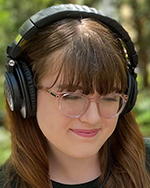
Erin Phillips
Erin Phillips is an audio producer, communications professional, and Jewish educator from Alexandria, Virginia. She has a BA in Social Innovation and Enterprise from George Mason University. Erin has produced thought-provoking stories for popular shows like Out There and the Duolingo English podcast, as well as local community radio.
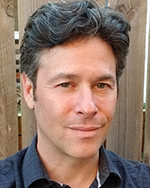
Jeremy Shere, PhD
Jeremy Shere, PhD, is a podcast producer based in Bloomington, Indiana. Jeremy earned his doctorate in English Literature and Jewish Studies from Indiana University. He is currently the producer of the Frankely Judaic podcast for the Jewish Studies program at the University of Michigan.
Executive Producer: Warren Hoffman, PhD
Producers: Avishay Artsy and Erin Phillips